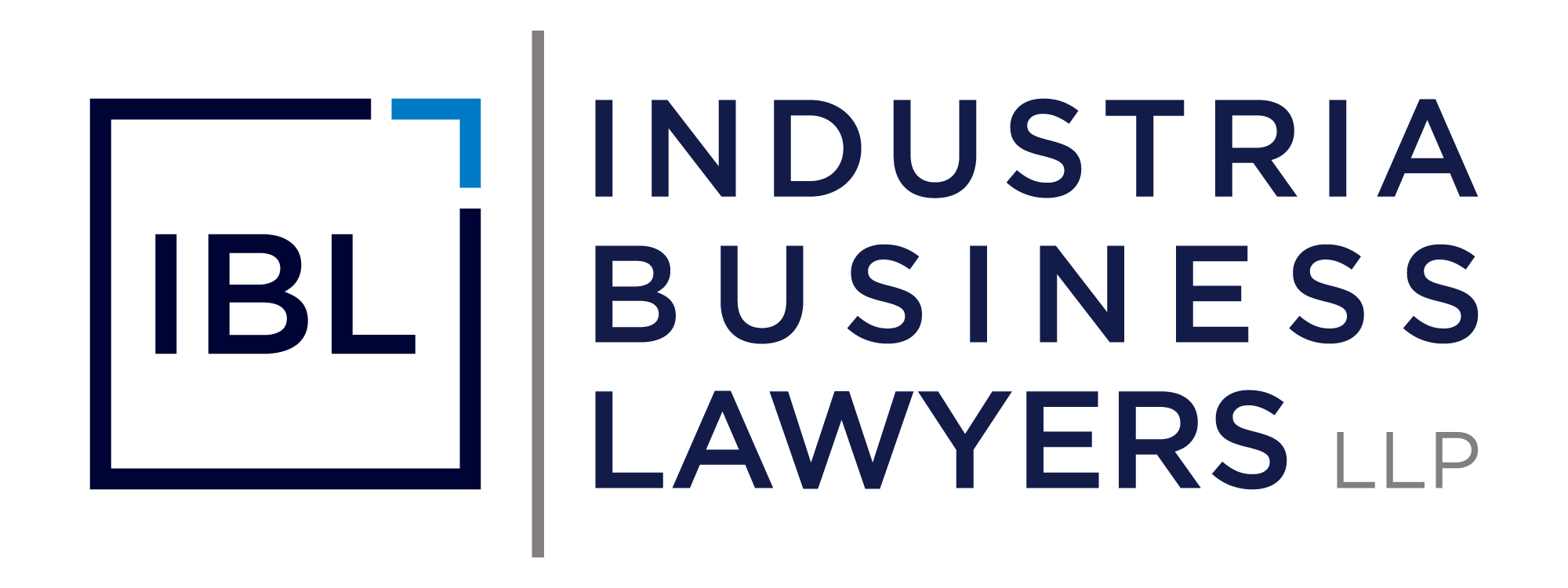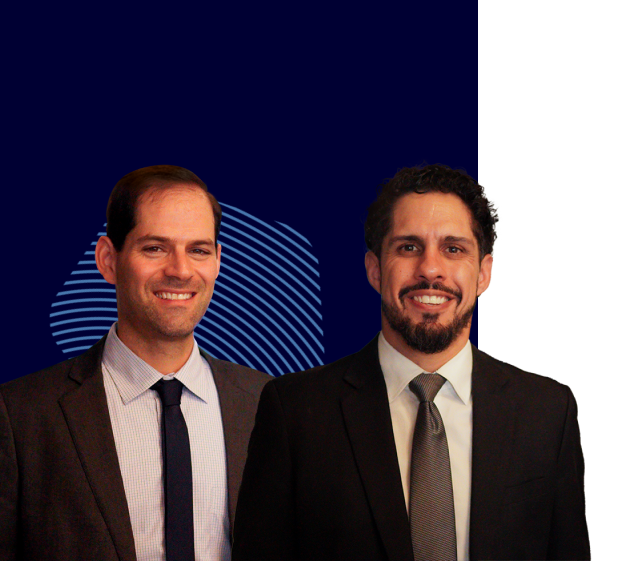The following is an interview between our Business Development Manager, Allys Benitez (AB), and Eric Ubias (EU), counsel at Industria Business Lawyers, and a leading expert in compliance and regulatory advisory for emerging and growth companies with international operations. With a wealth of experience navigating the complexities of U.S. laws related to trade, investment, and digital assets, Eric has become a trusted advisor to companies across a range of industries, from manufacturing and telecommunications to blockchain and cryptocurrency.
AB: Tell us more about your journey to IBL and your current role here.
EU: We’ll start with the journey to IBL. If you have more questions about the career, which is a lot longer since I’ve been practicing for a number of years, we can dive in there. In terms of IBL, I have known Aaron and Alex for a number of years. The first time I met Alex was actually on a panel for the Hispanic National Bar Association conference on digital assets or blockchain technology. This is where we connected. It took a number of years for us to find the opportunity to collaborate, but I’d say around 2019 or 2020 is the time that I was onboarded and started working with both of them on projects in that space and as counsel.
AB: Can you walk us through your career journey and what inspired that transition from traditional law to focusing on compliance and cross-border trade issues?
EU: Coming out of undergraduate with an international relations degree and not wanting to do that necessarily, I ended up taking night classes, and while I was working, I became very deeply involved in network administration—that’s everything from the routers and building out networks and having that skill set. I continued that interest in tech, and I wanted to have something tangible, liking that aspect of it, and I still do it today. When I went to law school, there wasn’t a specific “let me be a litigator” or some goal beyond the challenge, and I didn’t really have the tech aspect part of it. I came out, did well, and went to Georgetown here in DC. It was a time where you got good grades, walked across the street, and had a number of job offers. I landed at a fantastic global law firm, and then when I started, the market crashed, so this was 2008. A number of fantastic attorneys were let go, not just from our firm but other firms, and I also think the state of the market had changed. I think that shaped my career. When you are at a firm, particularly when you are younger, you need to have mentors and you need to have some idea of what you want, and I think that I approached it more defensively. With the debt obligations and coming from a more humble background, making sure I took care of the student loans, saying yes to projects, and being indispensable was great; it meant you could stick, but it also meant that I wasn’t focused on what I wanted to do or what I wanted to accomplish. I had a number of experiences—false claims act, anti-corruption, antitrust—and I ended up focusing on the white collar group on government investigations, leveraging the Spanish that I speak on investigations in Latin America. The thing that I liked most was representing a number of private equity companies where you had a private transaction and the portfolio company that resulted would need to build out the compliance program. That was one thing that I volunteered for that other people may have liked, but I really liked working with executives and doing training and building out that policy and procedures and advising on that. Then, you come to a point of what are you going to do next? You are at a firm where everyone is smart and everyone is hardworking, but they’ve been thoughtful about their career, and I realized that I had gaps. If I wanted to do this international presence, advice on these cross-border issues, things like trade compliance kept popping up, and then in the world of big law, you have hyperspecialization where the practice areas, you need to be able to issue spots, but you hand them over to other specialists at the billing rates that you have.
I had an opportunity to work with a very sharp attorney who I knew from undergraduate who had a boutique law firm in the trade space, and they were working on something with the firm that I was at. It ended up being a reported case in the DC circuit, and I was able to step in, not necessarily in that litigation, but to get my chops, almost as a first year associate on trade-type aspects, which you certainly can’t do as a senior associate at a bigger firm, and sort of fill in that gap of what I was missing. It felt like it made a more complete attorney. We have this traditional approach; meanwhile, on the side, I spent time looking into bitcoin and blockchain technology in 2016 and 2017, but not figuring out how to monetize it or what to do. I just liked it from the technology aspect.
It was when I left the boutique to start my own that I realized that when you are dealing with the crypto world, it is much safer and better to have other people working with you because it’s incredibly complicated technology across a range of issues and you want to have someone that you can lean on and sharp teams who have the same approach as you and it wasn’t until I teamed up with Alex and Aaron that I felt comfortable taking on those types of matters, particularly in light of the enforcement actions that were going on, post DAO report, and what does it mean as an attorney to operate in this space, bringing your ethical responsibilities to bear, understanding of the laws, and advising clients in a smart way, so they can accomplish goals.
AB: When advising companies with international footprints, what are key factors you consider regarding local compliance requirements?
EU: I think I would say for local compliance requirements, we have to stay within our lanes as U.S. attorneys. We should be able to issue a spot. IBL has a fantastic network of local counsel there, and we work with foreign attorneys who have matters where they need US counsel, but in terms of the advising, what I would say is that I’ve noticed that before the United States was the golden standard in terms of these legal regimes and making sure that you could comply with U.S. laws in the world against corruption, sanctions, or export controls. You could tweak it to make sure you are complying with those local requirements, but you just didn’t have that same robust enforcement or built-out regimes, and other countries would often look to us, and I started to see that change even a couple of years ago when I was with GDPR and the enforcement things. That sort of continued. Where we are now with crypto is even more the case. You have this patchwork—yes, you have security laws, yes, you have the commodities of the law, yes, we have a big secrecy act, but when you are someone who is moving overseas, you have to be much more aware of those regimes and be cognizant of what those requirements are. You can’t just say I’ve generally built a compliance program, and my understanding of U.S. law is going to work outside of the United States. Both because it won’t and because you have that more robust enforcement. More aggressive regulators outside of the United States that I’m not sure I saw pre-2015; you see some, but you often saw the thing where the U.S. would take the lead and the other ones would sort of collaborate and lean on us.
AB: In your experience, what are the most significant regulatory challenges companies face in the cryptocurrency space?
EU: I think of crypto and crypto projects being something at the top of the tree, and as you fall, you hit every branch, and every one of those branches is a law that you hit all the way to the ground. One example: think about a bitcoin mining company. They have their usual traditional, ‘do you have your licenses?,’ ‘do you have your employees?,’ ‘do you have your contracts?’ Since they are involved in energy, ‘do you have your energy agreements?’ The sort of traditional things that advising and corporate counsel might provide. Then you layer on this aspect of crypto currency regulations, and when I say that, the same way you think about the internet law back in 2000. Now there are different aspects, but we’ll just say crypto currency for now. They need to worry about what they are doing, how they are financing it, are there any money laundering implications, do they have obligations to build out those types of compliance programs, and what they are doing with the bitcoins. There’s an additional layer of obligations that we have to layer on. Then you add on if you want to take on a foreign investor. Not only do you have to worry about national security implications under CFIUS, this is the law where if you have a bitcoin mining company or some data center, there are disclosure obligations, and you are seeing, for example, in the bitcoin mining space, they have this capacity, they have this structure, maybe they are starting to dabble into AI. You think about someone saying ‘I’d like to just buy something, have a bunch of computers,’ and you can sort of see what are the legal regimes that they have to comply with. For bigger companies, they may have the capacity and the financial wherewithal, but oftentimes there’s pressure on smaller companies who haven’t brought something to market or haven’t deployed on how to manage those compliance costs and those risks. How do you prioritize? What is the most important? What can you do to put your best foot forward and get your product to market?
This puts a challenge on attorneys because we can be expensive. This idea that we need to hyper specialize—I’m starting to see this unity of legal regimes where attorneys are needing to be aware and be able to issue spots for clients across a number of different regimes. Even if they don’t necessarily handle it, being conversant enough and being able to articulate can get you so far, but you are going to need additional counsel for this.
AB: How do you envision the intersection of traditional industries like manufacturing or real estate with blockchain technologies?
EU: So now I have the opportunity to go back and explain what the interest was in this. I did some articles in 2018 and 2019. The five things in-house counsel needs to know about blockchain and generally the technology itself is not new. The digital signatures, the functions, the peer-to-peer networking, the distributed database—a lot of those are things that have existed for a number of years. What I think the innovation was was the coordination in this adversarial manner, specifically in bitcoin, where you have these multiparty players in an adversarial manner able to engage in sort of a game theory-type contest that secures data. If we knew who Satoshi was, that’s the type of solution that you might see winning a Nobel prize. The same way that Nash won it for the equilibrium in the game theory context because it was something that was innovative. It seemed simple in retrospect, but applying the capitalist principle in this type of setting yields outcomes where players secure databases. Why do I say that? Because oftentimes you look at things like private blockchain and enterprise blockchain solutions and you say, Why are you using this technology?
For a number of years I thought, What does this do well? Oftentimes it’s less efficient; it requires a tremendous use of energy, although that’s kind of changed now with the shift from proof-of-work to proof-of-stake. Are there multiple players that are involved that might need access to this data? Is there a lack of trust in that? And do you need to maintain data integrity and auditability? When you have those three things come together, I think that’s when you see the best use case for blockchain. That underlying technology. We have been talking for a number of years. We had a panel where someone from Walmart was talking about their blockchain solution for tracing lettuce because it would allow them to not have to destroy the entire lettuce crop, and they were able to trace a particular thing. Or you see all these other solutions, or trade finance, whenever dealing with multiple ships, a lot of those things have gone by the waist side. I’m not sure that you see the use case. It may be that its immature where you do see the use cases in payments, in money, which is what the original insight was—that there’s some incentive in the adversarial space.
What I would say is that when you think about cryptocurrencies or digital assets, you sort of divide it. What are we talking about? Are we looking at backhand underlying technology solutions like blockchain technology where people don’t want to have to think about it and it’s sort of deployed and you do your updates from your computer and it sort of is handled by the IT people? Is it the crypto trading where individuals have these assets, potentially NFTs or art, and they want to interact in that way or gamification of it? Is it more of a payment realm with stable coins? I was just at the DC Fintech, and there was a panel of Visa and Paypal people talking about the potential changes that are coming where you have traditional financial players coming into the space and what they are looking at. Are stable coins within appropriate guardrails? Might that be a potential solution? Where you take Fiat into stablecoin that allows you to transfer cross-border across multiple players and then come back out or stay in stablecoin. I think that some of the things that people used to talk about in 2016 or 2017 may still come to fruition, but they are often niche cases. I think there’s still potential value there, it can be challenging to implement and deploy those things, but obviously it will be more in the financial incentives where you have that public blockchain layer that sort of creates that secure underlying network that you can come into and out of for your own private uses or deployments.
AB: To wrap up, we want to know more about what your hobbies are outside of law?
EU: The biggest one this year that’s taken up a lot of time this year is that I started doing triathlons. I would say that probably in 2022, post-covid, it came to a point where I didn’t feel healthy and the doctors would sort of repeat the same thing. To give you an idea, I was maybe fifty pounds more than I am now. I spent a year doing Gold’s gym membership, and a year later, not seeing much more difference, and your health flashing red lights. I come from a family with a Mexican-American background, where the guys just don’t live long because of heart problems, cancer, or other things, and I promised my wife that I would try to live as long as possible. Now I have a kid too, so we are thinking about our health. What am I doing? And being stronger and trying to deadlift four hundred was not getting me where I needed. I used to like to run, but I didn’t have that motivation. I was in the gym one day and saw a post that said, “Do you want to try a triathlon?” It was a very baby one: twelve laps in the pool, a two-mile run, and a seven-mile bike ride. At the time I just had a three-speed, one of those heavy ones that you see; it was very cheap to sign up. I realized that I didn’t really know how to swim properly; running was fine; and I also didn’t know how to bike properly necessarily. I did that one, and I liked it enough to say I need to set a bigger goal, so this year I’ve done a few short-course triathlons. Long-course ones would be Ironman or Half Ironman, where you end with a marathon. The one I just did, I ended with a 10k, almost a mile swim, twenty-four mile bike ride, so I hit my goal and realized I need to increase my fitness. Learning those three disciplines and geeking out on, for instance, with bikes, thinking about gear ratios, rolling resistance on the tires that you are using, or how can you improve your aerodynamics? For swimming, realizing that I didn’t know how to have the proper form—you can get across the pool and hold your breath for a long time—but when you are swimming, maintaining that horizontal plane, maintaining speed, and being thoughtful. I’m very good about learning things from the internet and reading books and things, so I haven’t had a coach or anything. Maybe when it’s time to do one of the bigger ones, like Iron Man, but for now I’m happy where I am, and that’s been taking up a lot of my time.


